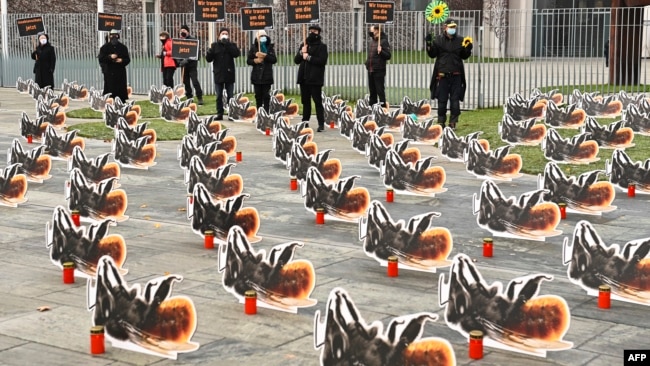昆虫、その意義
英語と共に、昆虫の意義のお勉強です。
「昆虫は世界の食物を受粉し、廃棄物を処理し、食物連鎖の中で重要な役割を果たしている。」
肝に命じたいと思いました。
下記のの単語を頭に入れて、
pollinate :~に受粉する [US] pɑ́lənèit | [UK] pɔ́linèit
apocalypse:黙示録[US] əpɑ́kəlìps | [UK] əpɔ́kəlìps
Let's listen!
今日のテーマは、insect!!
- 新しい研究によると、世界の昆虫人口が減少していることが判明
- death by a thousand cuts
- New Studies Show Drops in World Insect Population
- Words in This Story
新しい研究によると、世界の昆虫人口が減少していることが判明
New Studies Show Drops in World Insect Population
January 21, 2021
世界の昆虫専門家は、地球上の重要な昆虫の個体数は ”じりじり減少している”と言います。
新しい研究グループは、地球は毎年約1〜2%の昆虫を失っていることを示唆しています。損失は、気候変動、汚染、農業、土地利用の変化、化学物質のせいにされています。
コネチカット大学のデビッド・ワグナー氏は、12の研究の主執筆者であり、最近全米科学アカデミー紀要に掲載されました。研究には世界中から56人の科学者が参加しました。
昆虫の黙示録と呼ばれることもあるこの問題は、複雑な問題です。科学者でさえ、完全には理解していないと言っています。そして、この問題が複雑であるがゆえに、一般の人々が可能な解決策に興味を持つことは難しくしています。
ワグナー氏は、科学者は昆虫の損失のレベルが他の種と比較して大きいかどうかを見つける必要があると述べています。「もっと心配する理由があります。殺虫剤や除草剤、光害で「彼ら[昆虫]は攻撃の対象になっているからです」と付け加えた。「殺虫剤や除草剤、光害などで「彼ら(昆虫)が攻撃の対象になっているからです」と、彼は付け加えます。
殺虫剤や除草剤は、昆虫や植物を殺すことができる特殊な種類の化学物質です。
この研究をリードしたイリノイ大学のメイ・ベレンバウム氏は、昆虫の損失を30年前の気候変動と比較しました。当時は、気候変動の影響の程度や割合を測定する方法が難しかったと言います。
ベレンバウム氏によると、もう一つの問題は、多くの人が単に昆虫を嫌っていることだといいます。ベレンバウム氏は、これは事実です、小さな生き物が多くの良いことをしているにもかかわらずです、付け加えます。昆虫は世界の食物を受粉し、廃棄物を処理し、食物連鎖の中で重要な役割を果たしています。
昆虫は、”母なる自然と生命の木が構築されているthe fabric(布) ”だとワグナー氏は言います。
Fabric とは、織ったり編んだりした素材の一種。この用語は、また、何かの基本的な構造を意味することもあります。
ワグナー氏は、ミツバチとオオカバマダラという2つの有名な昆虫が、現在直面している問題の良い例だと述べています。ミツバチは、病気、寄生虫、殺虫剤、除草剤、餌の不足などが原因で姿を消しています。
気候変動によって引き起こされた米国西部の乾燥した天候は、蝶が食べるための乳草が少なくなっていることを意味する、とワグナー氏は述べています。また、アメリカの農業の変化は、蝶が蜜を得るために必要とする雑草や花を取り除くことにもなっています。
「私たちは中西部の巨大な地域に大豆とトウモロコシ以外の巨大な生物学的砂漠を作っているます」とワグナー氏は言います。
最近の科学論文は、新しいデータを提供するものではありません。それらは、より多くの注目を集め始めている問題の大きな、しかし不完全な絵を示しているのです。科学者たちはこれまでに100万種の昆虫を確認していますが、それ以上に400万種の昆虫が発見される可能性があるとベレンバウム氏は言います。
デラウェア大学のダグ・タラミー氏はこの研究には参加していません。しかし、彼は、この研究は世界がどのように "この30年昆虫を殺す新しい方法を見つけるために数十億ドルを費やし、わずかなお金でそれらを維持するために動いていること"を示していると述べます。
ペニーはわずかな金額です。
AP通信へのメールで、タラミー氏は、良いニュースは、人々自身が昆虫の損失を止めるために多くのことをすることができるということだと述べています。「これは草の根の解決策
を持つ世界的な問題である 」と彼は書いています。
death by a thousand cuts
文字通り訳すと、”千の切り傷による死” となります。つまり、ひとつひとつの傷は致命的じゃないけれども、千箇所も切られればそのうち死に至る、と解せます。
”じりじり減少する”と訳しましたが、”じわじわと破滅する”とも訳せます。
New Studies Show Drops in World Insect Population
 FILE - Environmental activists of Campact group stage a protest with some 200 oversized cardboard bees installed in front of the Chancellery on December 2, 2020 in Berlin, to call for more insect protection. (Photo by Tobias Schwarz / AFP)
FILE - Environmental activists of Campact group stage a protest with some 200 oversized cardboard bees installed in front of the Chancellery on December 2, 2020 in Berlin, to call for more insect protection. (Photo by Tobias Schwarz / AFP)
The world’s top insect experts say our planet’s important insect population is going through a “death by a thousand cuts.”
A new group of studies suggests Earth is losing around 1 to 2 percent of its insects each year. The losses are blamed on climate change, pollution, agriculture, land use changes and chemicals.
David Wagner of the University of Connecticut is the lead writer of the 12 studies, which recently appeared in Proceedings of the National Academies of Sciences. The research involved 56 scientists from around the world.
The problem, sometimes called the insect apocalypse, is a complex issue. Even scientists say they do not fully understand it. And the complexity of the issue makes it hard to get the public interested in possible solutions.
Wagner said scientists need to find out if the levels of insect loss are bigger in comparison to other species. “There is some reason to worry more,” he added, “because they [insects] are the target of attack” with insecticides, herbicides and light pollution.
Insecticides and herbicides are special kinds of chemicals that can kill insects or plants.
May Berenbaum of the University of Illinois helped lead the research. She compared the insect losses to climate change 30 years ago. She said back then, the methods used to measure the degree and rate of climate change effects were difficult.
Berenbaum says another issue is that many people simply hate insects. She added that this is true even though the small creatures do a lot of good. They pollinate the world’s foods, get rid of waste and play an important part in the food chain.
Insects are “the fabric by which Mother Nature and the tree of life are built,” Wagner said.
Fabric is a kind of woven or knitted material. The term can also mean the basic structure of something.
Wagner said two famous insects, honeybees and Monarch butterflies, are good examples of the current problems insects face. Honeybees have been disappearing because of disease, parasites, insecticides, herbicides and lack of food.
Drier weather in the U.S. West, driven by climate change, means less milkweed for butterflies to eat, Wagner said. And changes in American agriculture remove weeds and flowers they need for nectar.
“We’re creating a giant biological desert except for soybeans and corn in a giant area of the Midwest,” he said.
The recent scientific papers do not provide new data. They show a big but incomplete picture of a problem that is starting to get more attention. Scientists have identified 1 million insect species, while up to 4 million more are likely to be discovered, Berenbaum said.
Doug Tallamy of the University of Delaware was not part of the studies. But he said the research demonstrates how the world has “spent the last 30 years spending billions of dollars finding new ways to kill insects and mere pennies working to preserve them.”
Pennies are a small amount of money.
In an email to the Associated Press, Tallamy said the good news was that people themselves can do a lot to stop insect losses. “This is a global problem with a grassroots solution,” he wrote.
_____________________________________________________________
Words in This Story
apocalypse – n. a great disaster : a sudden and very bad event that causes much fear, loss, or destruction
species – n. a group of animals or plants that are similar and can produce young animals or plants
pollinate – v. to give (a plant) pollen from another plant of the same kind so that seeds will be produced food
chain – n. a series of types of living things in which each one uses the next lower member of the series as a source of food — usually used with the
parasite – n. an animal or plant that lives in or on another animal or plant and gets food or protection from it
nectar – n. a sweet liquid produced by plants and used by bees in making honey
preserve – v. to keep (something) in its original state or in good condition
grassroots – n. the ordinary people in a society or organization : the people who do not have a lot of money and power